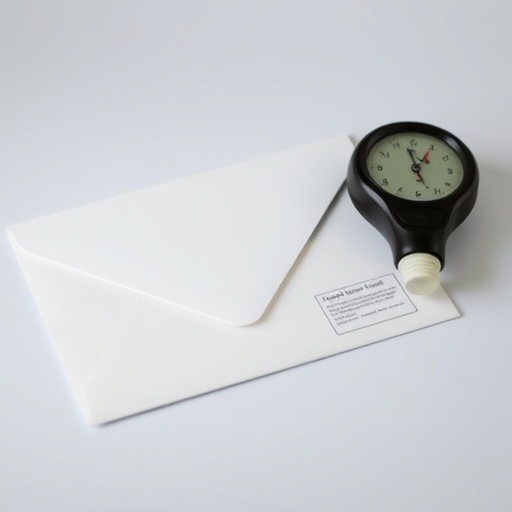In a groundbreaking study, researchers have investigated an innovative approach to managing hypertension through a simple yet powerful intervention: mailed patient activation letters. High blood pressure, a prevalent condition affecting millions worldwide, is a leading risk factor for cardiovascular diseases, often termed the “silent killer” due to its asymptomatic nature. This recent randomized quality improvement trial seeks to explore how enhancing patient engagement through tailored communication can directly impact blood pressure control, ultimately paving the way for more effective preventative healthcare strategies.
This trial, conducted by Cheng, M.K.W., Eseigbe, M.O., Orozco, J.H., et al., focuses on the effectiveness of mailing personalized activation letters to patients diagnosed with hypertension. These letters aim to motivate and empower individuals by providing tailored information, resources, and strategies to take control of their health. The heart of the intervention revolves around the principle that increased awareness and personal responsibility can catalyze a change in health outcomes, particularly in chronic conditions where patient engagement is crucial.
One may wonder how a simple letter can achieve such significant results. The idea is rooted in behavioral science, emphasizing that informative and personalized communication can evoke a sense of responsibility and awareness in patients. Furthermore, these letters are designed not only to remind patients of their hypertension but also to provide them with actionable steps, such as dietary changes and lifestyle modifications, fostering a proactive approach to their health care management.
Key to the study’s design is the randomized selection of participants, ensuring that the results are scientifically valid and reflective of a broader population. By dividing participants into control and intervention groups, the researchers can measure the direct impact of the mailed letters on patient engagement and blood pressure levels. This method not only underscores the rigor of the research but also enhances the credibility of the findings, positioning the study within the cannon of evidence-based medicine.
Upon analyzing the outcomes, the researchers are evaluating not just the changes in systolic and diastolic blood pressure readings, but also the level of patient engagement with their treatment plans. Through this method, they aim to ascertain whether the mailed letters were effective in not only lowering blood pressure but also fostering a deeper sense of ownership among patients regarding their health conditions. Understanding the psychological implications of treatment compliance is essential in developing holistic methods to manage chronic diseases.
Early findings from this research indicate potential improvements in blood pressure control among participants who received the activation letters. Patients reported feeling more motivated and informed regarding their condition, which translates into better adherence to treatment protocols and lifestyle adjustments. Data collected reveals that a majority of individuals who received these letters engaged in discussions with their healthcare providers about their treatment options, signifying a positive shift in patient-healthcare provider dynamics.
The implications of this study extend beyond the individual level. With hypertension being a global healthcare challenge, the widespread adoption of strategies like these could revolutionize how chronic conditions are managed. By promoting patient-centered care through innovative communication strategies, healthcare systems can potentially reduce the burden of hypertension and its associated costs. This proactive engagement model could serve as a blueprint for addressing other chronic diseases, ensuring that healthcare remains patient-focused and effective.
Furthermore, the cost-effectiveness of the intervention is a crucial aspect that researchers will delve into. With healthcare costs rising globally, finding affordable and effective methods like mailed activation letters represents a significant opportunity for health systems struggling to manage chronic conditions. The trial’s results may encourage policymakers to invest in similar communication strategies, potentially transforming public health initiatives on a larger scale.
It’s important to acknowledge that not all patients may respond similarly to mailed activation letters. The researchers are committed to digging deeper into demographic variables that affect engagement and treatment adherence. Understanding the diverse backgrounds and needs of patients will be critical in tailoring future interventions, ensuring they are inclusive and effective for various populations.
As the study progresses, its findings could substantially impact future guidelines and practices within medical communities, advocating for a shift towards more personalized patient care models. This aligns with a growing recognition of the importance of addressing social determinants of health, reinforcing the idea that wellness is deeply intertwined with individual circumstances and lifestyle choices.
In conclusion, this pioneering trial exploring the effectiveness of mailed patient activation letters holds promise for enhancing blood pressure management. With its focus on empowerment and education, it emphasizes a paradigm shift in chronic disease management, one that recognizes the critical role of patient engagement. As the healthcare landscape continues to evolve, embracing innovative strategies like this could lead to better health outcomes for millions.
In the face of rising challenges posed by chronic diseases, studies like this remind us that often, simple solutions rooted in effective communication can lead to profound changes in patient health and wellness. As this research unfolds, it will be interesting to observe its impact not only on individual health outcomes but also on the broader field of public health policy and chronic disease management initiatives.
The findings from this research are expected to be published in the Journal of General Internal Medicine in 2025, promising to contribute significantly to the ongoing discussions around effective interventions in hypertension management. As the healthcare community awaits the official findings, the anticipation builds around the potential of these simple yet powerful intervention techniques in reshaping lives and healthcare practices alike.
Subject of Research: Effectiveness of Mailed Patient Activation Letters for Blood Pressure Control
Article Title: Effectiveness of Mailed Patient Activation Letters for Blood Pressure Control: A Randomized Quality Improvement Trial
Article References:
Cheng, M.K.W., Eseigbe, M.O., Orozco, J.H. et al. Effectiveness of Mailed Patient Activation Letters for Blood Pressure Control: A Randomized Quality Improvement Trial.
J GEN INTERN MED (2025). https://doi.org/10.1007/s11606-025-09946-0
Image Credits: AI Generated
DOI: https://doi.org/10.1007/s11606-025-09946-0
Keywords: Hypertension, Patient Activation, Blood Pressure, Health Communication, Quality Improvement Trial.




